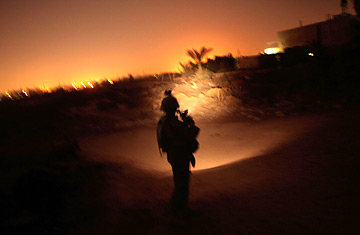
A soldier uses a light on the end of his rifle while searching for hidden weapons during a night patrol in the Dora neighborhood of Baghdad.
The quietest time in Baghdad usually comes around midnight. Curfew falls. People across the city turn off lights and bed down, easing the load on the electricity grid enough to allow government-run power-lines to flow. Generators go silent. Fumes clear, and stars come into view in the clear night sky. On some evenings these days if you stay up late you can hear unbroken hours of hushed calm stirred only by the distant barking of dogs or the wispy echoes of a jet high overhead. Other nights, though, the crunch of bombs falling around the city begins to sound heavily as the clock moves through the hours of the early morning.
On some nights only half-a-dozen or so bombs can be heard hitting southern Baghdad and other quarters of the city. On other nights neighborhoods within earshot of the Green Zone take brutal hammerings, a dozen strikes or more crashing in the darkness. For weeks it has gone like this — relative calm in the city during the day followed on many evenings by a chorus of explosions around the city. In the past several days, however, dawn has brought blasts of its own, a seeming answer by insurgents and militia fighters to assertions by U.S. and Iraqi officials that Baghdad and other areas of Iraq are on the mend.
On Friday, at least 13 people died when a bomber struck a popular pet market in heart of the city shortly before 9 a.m. An estimated 60 others were wounded in the explosion. At least two other bombs went off in areas north of Baghdad, leaving at least 26 people dead across the country in all for the day. On Thursday, a volley of 10 mortars sailed into the Green Zone, which had enjoyed many weeks without such attacks. And earlier that day insurgent fighters attacked Iraqi security forces in the southern reaches of the capital in fighting that left least 13 dead.
U.S. officials in recent weeks have touted successes in bringing down the level of violence in Iraq, saying statistics showed that the weekly number of attacks in have dropped to their lowest levels since February of 2006 — just before sectarian war fully blossomed. According to the U.S. military, attacks of all kinds per week nationwide have fallen to roughly 575, down from a high of roughly 1,600 in June. Civilian deaths have fallen by 60% nationwide since then, too. In Baghdad, easily the most violent area of Iraq, a grim measure of the prevailing conditions comes in the count of bodies found daily on the streets. Nowadays about five corpses surface each day in Baghdad. Only eight months ago the average was as high as 35.
Amid all this some Iraqis who fled Baghdad during the height of the sectarian violence in 2006 have begun cautiously venturing back to the city from safe havens found in neighboring countries or elsewhere in Iraq. Life in some parts of the city has taken on an air of normalcy, with shops and restaurants open at night. But even if the current level of calm holds, Baghdad remains the center of one of the bloodiest realms on Earth on any given day.
